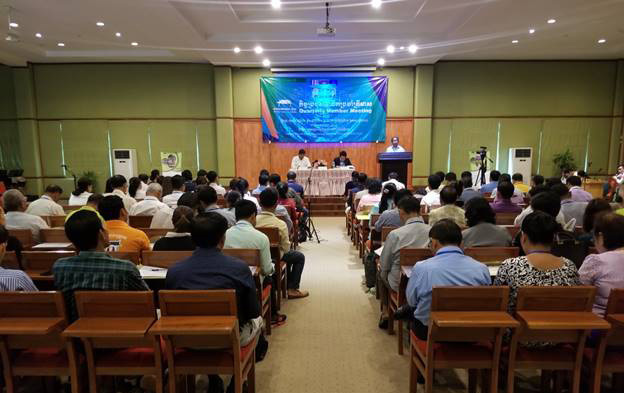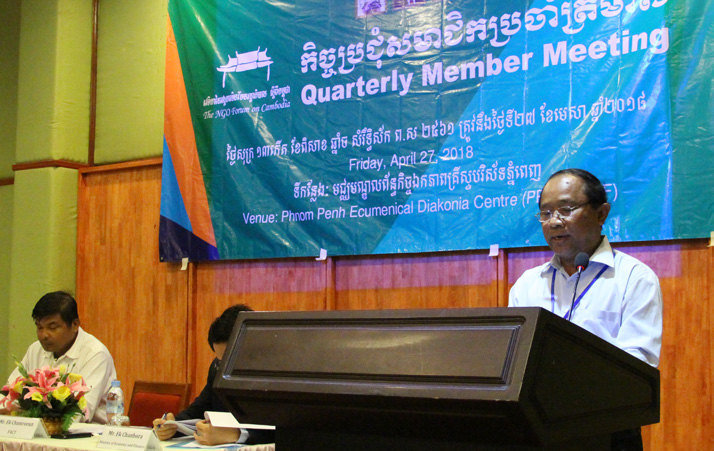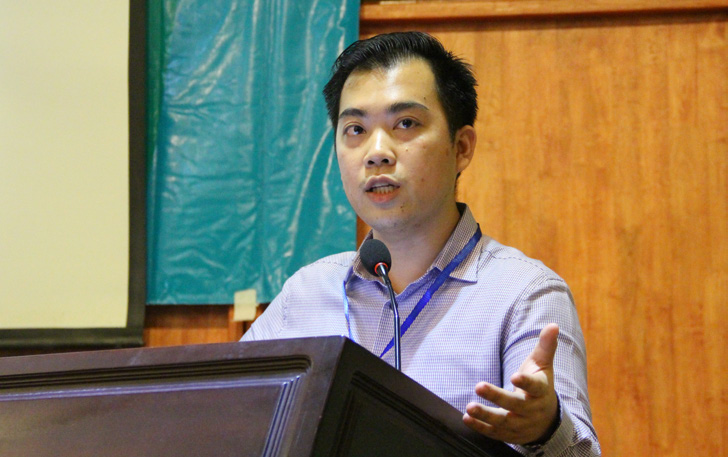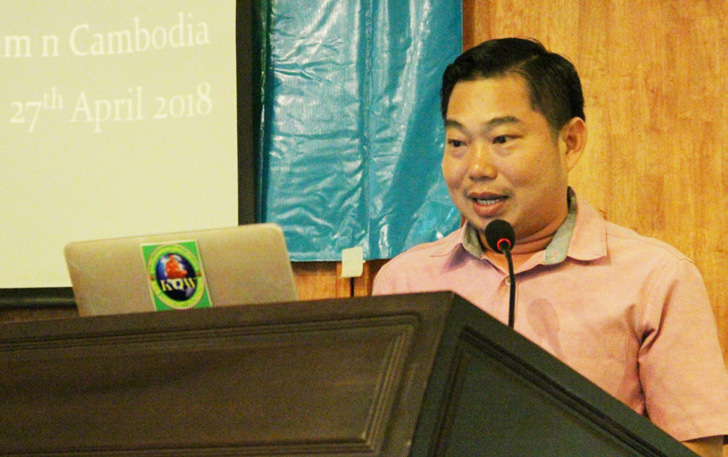
The NGO Forum on Cambodia (NGOF) invited its members, donors, and partners who were supporting NGOF’s mission to attend Quarterly Members Meeting (QMM). The meeting discussed on key achievements, challenges, lesson learnt, good practice and feedback from members for further implement next quarter work plan. The meeting was held on April 27, 2018 from 8:00 am- 12:00 at Ecumenical Diakonia Centre (PPEDC) Phnom Penh with 110 participants (37 female). The key guest speakers from ministry of Economy and Finance and two speakers from private companies were participated in the presentation on the 1) updating significant progress report of NGOF; 2) Social and Environmental Safeguard focus on the presentation on the standard of compensation and resettlement policy, presentation of Environment Management Plan and compensation policy in EIA Report, presentation on the first draft report of Fair Compensation Policy.

Mr. Ek Chamroeun, chair of meeting, management committee member of the NGOF on Cambodia, Mekong Project Coordinator of FACT gave a warm welcome and thanked to all NGO members, government, and development partners for their participation in the important meeting. He briefed the key agendas of meeting as following: 1) updating significant progress report of NGOF; 2) Update on the preparation of a joint CSO agreement in Cambodia on effective development cooperation; 3) Social and Environmental Safeguard. NGO Forum has good cooperation with key relevant ministries such as MOE, MAFF, MRD, MOEF, Ministry of Land and coordinated with net¬work members to accomplish many major achievements within the last quarter.
Update on the preparation of a joint CSO agreement in Cambodia on effective development cooperation

Mr. Ek Chanbora, an official, General Department of Policy, Ministry of Economy and Finance, presented on the Macroeconomic Policy Framework and Public Financial Policy Framework for the drafting of the Financial Law for the Management of 2019. The Global Economy is better. The Cambodia Economic growth is expected that still strong in 2018-2019 in four sectors such as construction, garment factory, whole sale and retail, and tourist. The World Bank considered Cambodia as middle income country. Asian Development Bank (ADB) called Cambodia as a new ASEAN tiger. Cambodia is changing the structure from dependent on the agriculture to dependent on industry sector. The currency exchange rate is stable. The bank sector continues to grow. Foreign Direct Investment increased. Reserve capital continue to increase. The drafting of the Financial Law for the Management of 2019. Now it time for drafting of the Financial Law for the Management of 2019, the first stage is to call for budget strategic plan from all ministries, the second stage is to prepare budget package and the third stage the government will approve the national budget. The tax policy is the key for ensuring the success of government reform program, stabilization of macro economy and sustain¬ability of economic growth in the medium and long term.
Update on Social and Environmental Safeguard
Mr. Ham Kim Kong, General Director of E&A Consultant, Presented on Environment Management Plan and Compensation Policy in EIA Report. Because of the time constrain, Mr. Ham Kim Kong suggested to give the presentation in advance. The Compensation Policy and resettlement. The request of the three type of projects implementation including the project implement by company and state, state and state and the company project. It stated all the key points. We need to look at the environment management plan, who will involve in the implementation and monitoring the development project .eg. After study, who will involve in the monitoring of the EIA project.

Mr. Kim Chanvibol, Deputy Director of Department of Resettlement, 2, General Department of Resettlement, Ministry of Economy and Finance, presented on the standard of compensation and resettlement policy. The Cambodian Economic growth about 7%. Before 1979 there is no any compensation to the community. In 1999 the government set up the compensation committee (IRC). The IRC chaired by Economic and Finance unit of ministry of Economic and Finance. It is under the cooperation and debt management. In 2005 set up the compensation unit. In 2008, changed to resettlement department as secretariat of IRC. In 2016, changed to general director¬ate of resettlement. IRC provide compensation for the national infrastructure project. No force eviction for compensation.
Public consultation taken place many times in all stages with the participation of development partner. The compensation implementation based on the compensation policy which agreed by IRC and DPs. Even though DP has no policy, the government has clear principle for implementation. The legal framework and compensation pol¬icy. The compensation policy softly made and facilitation between the law and legal framework, humanitarian principle, social equity principle and policy of development partner. The purpose to ensure sustainable development and equity between the affect community and beneficiary of the project especially for poverty reduction. The legal framework and regulation including constitution in 1993, land law in 2001, appropriation law in 2010, sub decree number 197 on the management of ride of way and railway road, and sub decree number 118 on state land management. The feasibility study to mitigate the impact at the minimum level. The community knows the status of the development project. Development Partner also involve in the feasibility study. The re¬settlement Plan should be done by the consultant to prepare the plan for ADB or WB which agree by IRC and DP. ADB have social safeguard policy. The safeguard policy has fours principles, land law, constitution, and appropriation law. People have equal right to access the information and get appropriate compensation to their property. The department of resettlement has authority to deal with Standard of Operation. The company should respect the right of the community. The company should have technical plan to mitigate the impact on the community and apply it fairly. eg. Development project affect their property, the community will get the fair compensation. The community should access to social land concession when the company comply with it. If it affects pagoda or hospital, then the government will construct new hospital or pagoda. If the community lives below poverty line then the government will fully pay for their property. eg. payment for the compensation to the community and resettlement them to the new place. Recommendation to NGO to educate the community to understand about the government policy.

Mr. Kay Leak, Independent Consultant, Presented on the First Draft Report of Fair Compensation Policy. Should have a common framework/policy. Document collects from many sectors. In Cambodia there are many complicate and difficult issue related to land. There is land law. No one should deprive their right from their land. It should pay compensation before taking their land. In 2005 the compensation policy has developed. The company should start the livelihood and income generation program for the community. The company should study the social and environment as well as livelihood situation of the community. The government should pay for their property. In 2003 the company should pay for the community. In Vietnam, if the community owed the government then the compensation to the community should be deducted. The government relocate the project land for payment to the community. In Thailand the compensation would pay to the community. The company study the market price so that the compensation should properly made. The community has the right to have access to the project and request for compensation. In China, in 1998, 2004 the law stated that the compensation should be 100%. The compensation standard should be the same. The relocation should be done properly. In India, all compensation should be double pay in market price, in the rural area, four times compensation was made. The community gets payment every month for their livelihood improvement. The safe¬guard policy for involuntary, should avoid all issue which affect the community. The payment should be in cash. All community has access to all information especially the compensation and resettlement plan. The vulnerable people should have special sup¬port. The World Bank has policy to compensation because the safeguard policy should be applied and address properly issue. The community should have plan and choice for choosing eg. Live in the place where they able to live and the company fully compensate to them. The resettlement should be done properly even though the community have plan or not. The recommendation to the national government may consider for a single policy to address the resettlement and compensation. The single policy may be called as ‘Guidelines for Fair and Just Compensation and Transparency in Resettlement -2018. The government should have common standard to address the compensation issue. The minimum standard should be developed for address the compensation and resettlement issue.
At the closing of the meeting, Mr. Ek Chamroeun, thanked the honorable guest speak¬ers and participants for sharing the knowledge and experience related to the topics proposed at the meeting responding to objectives and expected results.